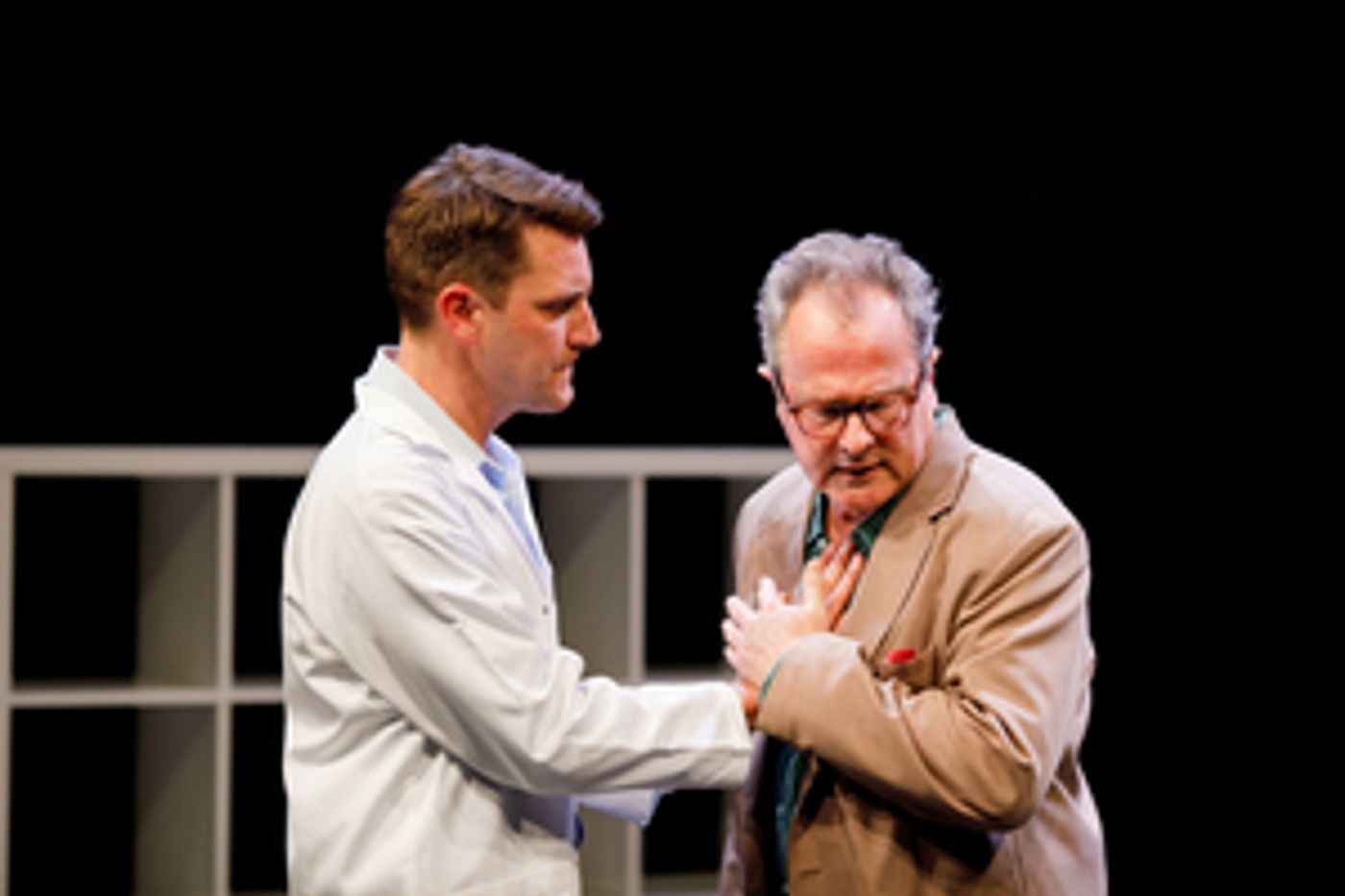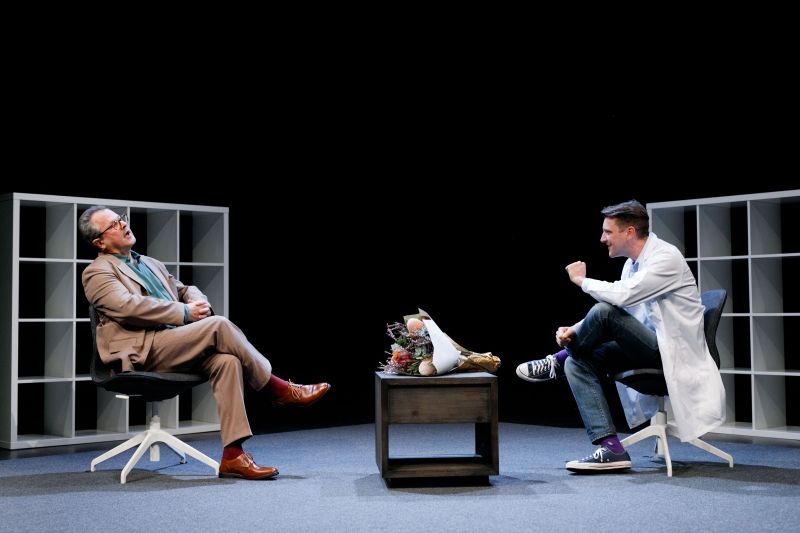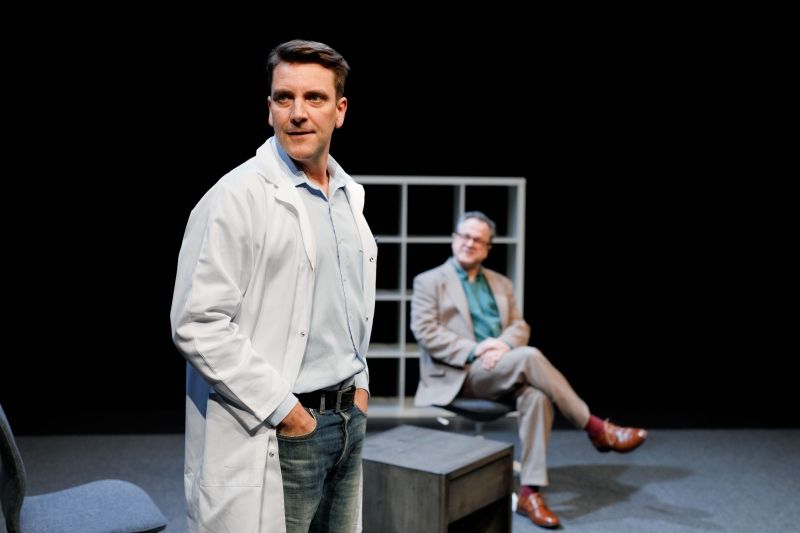Review: SAVAGE GRACE at State Theatre Centre Of WA
Steamworks Productions goes back to where they began with powerful rework

It is 21 years since Steamworks Productions made their debut performance, taking on the daring project of SAVAGE GRACE. To celebrate their birthday, they returned to their inaugural production, bringing along the original creatives and cast to make it happen. The result is a triumphant performance that speaks as much to where Steamworks is as it does to where it started.
The play starts within a new context to its original iteration; a video conference call to discuss COVID reunites ethics Professor Robert Bavaro (played by Humphrey Bower), and HIV/AIDS specialist Doctor Tex Cladakis (Gibson Nolte). The two are then transported back to the turn of the 21st century, into a world coming to terms with the HIV epidemic. The two form a relationship, first by constant one-upmanship, then by sparring over euthanasia, and finally by connecting and opening up to each other.
Humphrey Bower puts in an excellent performance as Professor Bavaro, an ethicist. He utilizes his voice- well known from narration and reading audiobooks- to convey a genuine gravitas and belief in his words. His character demands attention and is taken aback when the brash Dr Cladakis doesn't give it as readily as Professor Bavaro would like. His character's ethics are influenced by his religious beliefs, and in many ways, this is one of the walls protecting Bavaro that is steadily brought down during the play. Bower's portrayal is a very recognizable character, and he plays it as if we were sitting down to dinner with him. He readily discusses multiple points of view whilst driving his own.

Gibson Nolte also portrays Dr Tex Cladakis wonderfully. He is somewhat like Hawkeye in M*A*S*H, a brazen persona hiding a doctor that genuinely cares about his patients. Nolte controls the emotions perfectly, quickly switching his own mood, and from that, the mood of the play, from humorous to emotional and back again. Nolte genuinely captivates the audience with his character, and whilst the play is written so that neither character's point of view is favoured, you can't help but want him to succeed.
SAVAGE GRACE deals rather matter-of-factly with both HIV/AIDS and euthanasia. Whilst HIV seems to be less discussed today than it was 20 years ago, euthanasia is a prominent issue still with many states, including Western Australia, legalizing voluntary euthanasia recently. However, as director Sally Richardson said in our interview (which you can read here), playwright Alana Valentine's writing is timeless. Indeed, the play does not lend itself to one time over another. The striking down of the Northern Territory's euthanasia laws in 1997 is the only moment at which the play betrays its timeline, but yet it could just as easily fit in at any point. The constant back-and-forth between Cladakis and Bavaro drives the play deeply into the ethics of euthanasia, yet at no point does it preach to the audience. Indeed, it does not end with a position, and throughout the play the audience is taken from one side of the debate to the other. It is wonderfully written and it becomes plain to see with hindsight how Alana Valentine has gone on to bigger things after authoring SAVAGE GRACE.

The rapport between the two actors is clear throughout the show. The two have become good friends since initially appearing in the production 21 years ago, and that much is clear. They argue, debate, and flirt with each other effortlessly, with the many layers and subtexts of their evolving relationship happening organically and in front of the audience's eyes. The quality of the relationship dynamic speaks a lot for Sally Richardson's directing skills, too. On a minimalist stage with the audience close, the way the two characters interact is important. Early in their relationship there is palpable discomfort and tension when they encroach each other's personal space, but as their relationship progresses the uncomfortable tension becomes sexual tension and charge between the two. Richardson's extensive directing experience and focus on movement of bodies really comes to the fore to create atmosphere. Similarly, Cat Hope's music, the original score used in 2001, superbly reflects and sets the tone in each transition between scenes. Much the same as everyone else who contributed to the original run, Hope has gone on to find great success in music.
Many plays drag you into a storyline or progression of feelings and can sometimes be reckless when dealing with sensitive topics. This is most certainly not the case with SAVAGE GRACE. Rather than dragging you in, Gibson Nolte, Humphrey Bower, and Sally Richardson merely invite you in. Their invitation is impossible to resist and at times you feel as if you are party to a genuine evolving relationship. You are allowed to feel comfortable as the two actors navigate love, homosexuality, euthanasia and ethical quandaries. It is plain to see why and how Steamworks Productions and the many talented people involved with it have evolved and grown since 2001. By reflecting upon and re-doing SAVAGE GRACE, they showed a great deal of who they are and what they mean, and showed us that there is much to be gained from looking back at past successful theatre productions. Perhaps, indeed, they also reminded us that there is value in looking back to where we began.
Images thanks to Daniel Grant.
Reader Reviews
Videos

